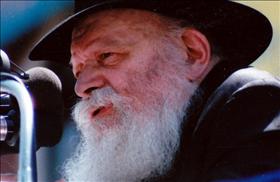Hiddush on the battlefront:
Chabad's illegal outreach at Ben Gurion Airport
Chabad Lubavitch is a unique phenomenon in Jewish history and the Jewish community. Much can and should be said in their praise, but at the same time, it should be recognized that both theologically and operationally they are highly controversial.
19/06/2018 10:21
Tags: Chabad · Supreme Court · airport

Rabbi Menachem Mendel Schneerson, source: Wikipedia
The challenges to Chabad arise not only from secular and non-Orthodox circles, but also from traditional Orthodox circles. One such scathing critique came from Orthodox Jewish scholar of history Rabbi Prof. David Berger, Dean of Yeshiva University's Bernard Revel Graduate School of Jewish Studies. He published a thorough study of Chabad, titled 'The Rebbe, the Messiah, and the scandal of Orthodox indifference.' A well-known anecdote is attributed to Rabbi Shach z"l, the foremost past leader of the Lithuanian yeshiva world who advocated boycotting Chabad. When asked which religion is closest to Judaism, he responded, "Chabad."
At the same time, Chabad emissaries' acts of loving kindness are legendary and unparalleled. Rabbi Uri Regev recalls encountering an acclaimed Jewish professional who was not Orthodox. The Jewish professional introduced a Haredi-looking man next to him as his rabbi, explaining that he was the Chabad rabbi for his community. He had come to consider him as “his rabbi”, despite being a member of a non-Orthodox congregation for many years. He explained that when members of his close family had become seriously ill, he found that this Chabad rabbi was the only one who was there for him during this protracted time of need.
Whatever one may think of Chabad, its outreach tactics sometimes pose serious challenges, as we have come to realize on two occasions recently. Hiddush has been approached and felt the need to take action.
One incident involved outreach to school children in an attempt to win them over, as we've written about in the past. In this case, we are working with the school's parents association to prevent this from repeating. Interestingly, the local Chabad house denies responsibility but the operator of the booth is clearly a Chabad activist. This phenomenon is very much in line with the choice of Chabad to describe their mobile centers as mitzvah tanks and their outreach to children as God's army.
The second case involves Israel's Ben Gurion Airport.
The Court claimed that the airport is not a place for ideological debate, and that it would prefer not to allow the activities of any religious group, including Chabad.
In the 1990s, the Supreme Court ruled in a petition against Israel's Airports Authority and Chabad, following the refusal of the Airports Authority to allow the Reform Movement to operate a booth similar to Chabad's at Ben Gurion Airport. The Airports Authority claimed that the airport is not a place for theological debate, and that it would prefer not to allow the activities of any religious group, including Chabad, if forced to allow other groups, such as the Reform Movment, to operate a comparable booth. They further claimed that it was providing essential services to passengers. The Court accepted the State's position, and allowed only Chabad's booth, while limiting the scope of the booth's activities. The Court ruled that Chabad can distribute only materials related to essential services needed for passengers, such as information about Shabbat and holiday times in various countries, the locations of kosher restaurants, etc., but no ideological material to advance Chabad's views. It was also ruled that Chabad can offer individuals the service of putting on tefillin or using a lulav and etrog on Sukkot, but only in the area of its booth, without soliciting people in the passenger hall.
In retrospect, it is clear that Chabad did not consider itself subject to the restrictions imposed by the Court, and the Authority was not particularly committed to enforce these restrictions. Recently, this matter was raised in the headlines when the media reported a loud, charged confrontation in the passenger hall between a Chabad man who solicited laying on Tefilin among the passengers in the hall, and a passenger protesting that this was being done next to her seat in the hall, not at Chabad's stand, and disturbed her. Similarly, it turns out that most of the material distributed at the Chabad booth is ideological, much of it referring to the Lubavitcher Rebbe as the Messiah, which is in complete contradiction to the ruling of the Supreme Court.
Hiddush appealed to the Airports Authority and to Chabad, in order to remind Chabad that it is obligated to obey the ruling, and the Airports Authority must enforce this if Chabad wants to continue operating the stand on its territory. Hiddush expressed its hope that there would be no need to go back to court, and that the services provided to the passengers will indeed come to meet the limitations set by the court. Services such as putting on tefilin must be provided only to those who request them in the area of Chabad's booth and not throughout the lobby and the materials distributed must comply with the list of “necessary services”.